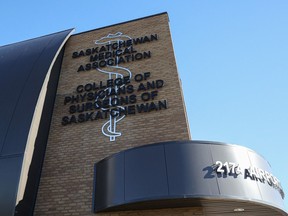The oversight body for doctors in Saskatchewan alleges Dr. Terence Davids crossed the line with comments he made in December 2023.

Article content
In areas where medicine intersects with personal values, where is the line when it comes to what a physician can say to a patient?
The College of Physicians and Surgeons of Saskatchewan (CPSS), the professional body that licences and oversees doctors in the province, recently alleged that one doctor crossed the line.
Article content
The CPSS brought a (non-criminal) charge of unprofessional conduct against Dr. Terence Davids for comments he allegedly made to a patient who was undergoing a preoperative assessment for a termination of her pregnancy in December 2023.
Advertisement 2
Article content
The document outlining the charge laid Feb. 13 states that the allegations it contains have not been admitted and a hearing hasn’t yet been held.
However, it states evidence will be led that Davids, listed as being a Saskatoon doctor, made one or more of the following statements, or used words to a similar effect:
“I hope you have loved ones in heaven who will take care of your baby in heaven.”
“I don’t think you should go through with this.”
“I think you should reconsider.”
“You will regret this and you can’t take it back.”
The document further suggests that the doctor asked the patient whether she believed in “our lord and savior” and when she responded no, he said, “Well you must believe in something.”
The doctor’s comments to the patient left her “uncomfortable and anxious,” the document noted.
All of this forms the basis of the charge that Davids is “guilty of unbecoming, improper, unprofessional, or discreditable conduct,” according to the CPSS.
The documents state this alleged conduct runs afoul of one or more of the rules, bylaws and policies that govern its members, including the CPSS policy entitled “Conscientious Objection.”
Article content
Advertisement 3
Article content
That policy is very clear that physicians are entitled to act on “deeply held and considered moral or religious beliefs,” described within the policy as “freedom of conscience.”
“Physicians’ freedom of conscience should be respected,” the policy states, in listing its guiding principles.
However, it goes on to state that this freedom of conflict may sometimes come into conflict with a physician’s obligations, and the policy seeks to offer doctors clarity on what to do in such a case.

Essentially, physicians can decline to provide “legally permissible and publicly-funded health services” if it conflicts with their freedom of conscience, but they must make arrangements for the patient to obtain “the full and balanced health information required to make a legally valid, informed choice about medical treatment,” and make an arrangement “that will allow the patient to obtain access to the health service if the patient chooses.”
A doctor can meet these obligations by making arrangements for the patient to meet with another medical professional.
The policy states that in exercising freedom of conscience, a physician should not impede access to such health services.
Advertisement 4
Article content
“Physicians’ exercise of freedom of conscience to limit the services that they provide to patients should be done in a manner that respects patient dignity, facilitates access to care and protects patient safety,” it states.
It’s a different situation when a doctor refuses to arrange access based on their medical judgement that the health service would not be clinically appropriate for the patient. Such a refusal is permissible but should, according to the policy, be accompanied by a full explanation to the patient.
The CPSS charge against Davids does not point to a specific part of the Conscientious Objection policy.
However, there is a specific section of the policy that deals with the provision of information.
“While informing a patient, physicians must not communicate or otherwise behave in a manner that is demeaning to the patient or to the patient’s beliefs, lifestyle, choices, or values,” it states.
It notes that a doctor mustn’t provide “coercive” information to patients.
“Physicians must not promote their own moral or religious beliefs when interacting with a patient,” it states.
The Leader-Post was unable to directly reach Davids at his clinic, and no response was received by deadline to a message left offering an opportunity for comment.
The CPSS website indicates he received his medical degree in South Africa, and that he has held some manner of medical licence in Saskatchewan since 2012.
His record indicates he has received no professional discipline in Saskatchewan.
Article content



